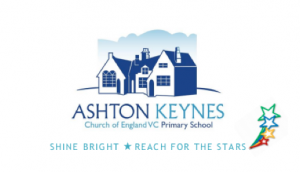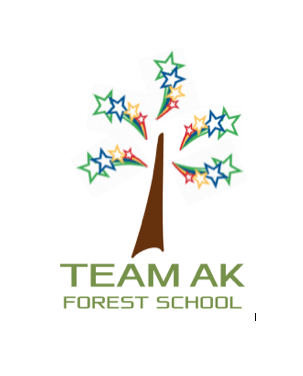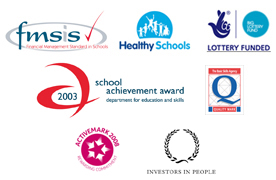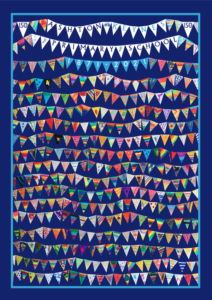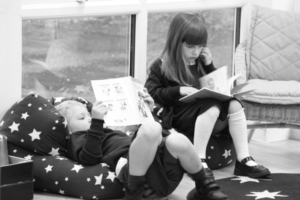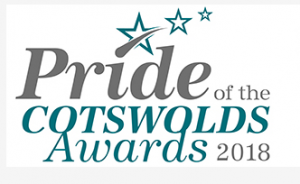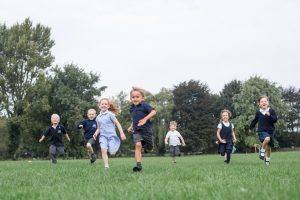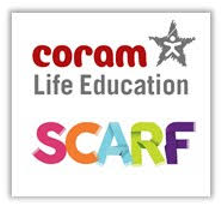SEND Information Report
Ashton Keynes Primary School SEND Information Report:
Information relating to Special Educational Needs and/or Disability provision in our schools.
Formulated by our cluster SENCOs (based in North Wiltshire) for all of our children and young people.
SENCO CLUSTER STATEMENT
‘Together we can share our expertise to make sure all children in our schools achieve their very best’
School Information
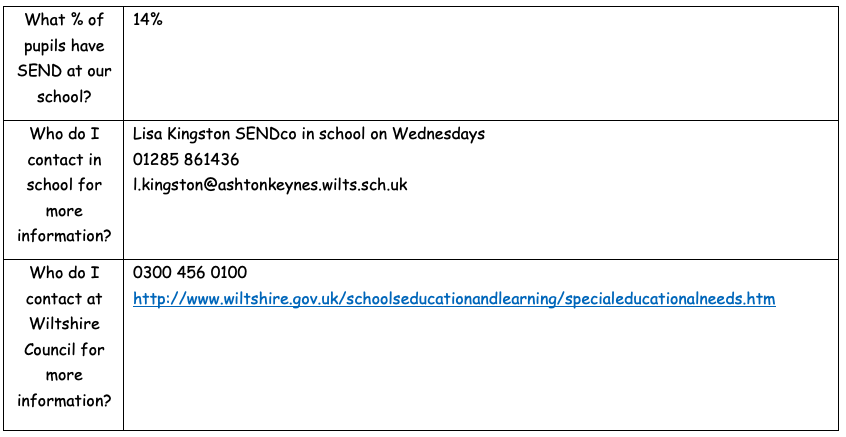
Special Education Needs and Disabilities (SEND) Policy
If your child has any additional needs when they start school please let the school Special Educational Needs & Disability Co-ordinator -Mrs Lisa Kingston know and a support plan can be put into place immediately.
If your child is identified as having any additional needs whilst they are at school we will plan together and have regular meetings to ensure we do our very best for your child.
We try to ensure that parents are well informed about all we do at school.
Annual Information Report July 2023
Name of SENDCo: Lisa Kingston M.Ed Inclusive Education
Dedicated time: Wednesdays
Contact email: l.kingston@ashtonkeynes.wilts.sch.uk
Contact Phone Number: 01285 861436
Name of SEND Governor: Nicola Eagleton
School Offer link: http://www.akps.org.uk/wp-content/uploads/2020/11/AKPS-Offer-Provision-Map-.pdf
Whole School Approach to Teaching and Learning:
- High Quality Teaching and Learning – All teachers are responsible for the learning and progress of every child in their class, including those with SEND.
- An inclusive, differentiated and personalised approach to enable all learners, including those with SEND, to engage with all aspects of school life.
- Refer to Teaching and Learning Policy
Our Graduated Response for Learners:
- Continual monitoring of the quality of teaching
- Identifying and tracking the progress of children that require support to catch up by Pupil Progress Meetings, targeted interventions. IEPs, Tutoring, Track back documents
- Identification of children requiring SEND Support and initiation of “assess, plan, do, review” cycle.
- Consideration of application for Education, Health and Care Plan.
- All children identified as requiring SEND Support, or with an Education, Health and Care Plan are on our SEND Register.
How we identify children that need additional or different provision:
- Class teacher refers to SENCO if the child is not making the expected progress or is below age-related expectations, in the lowest 20%
- Ongoing curriculum assessments
- Tracking progress using data
- Further assessments by specialists, including those from external agencies
We take a holistic approach by all aspects of a child’s development and well-being. Our pastoral support arrangements for supporting the emotional and social development of all children, including those with SEND, is set out in our School Offer. Our measures to prevent bullying can be seen in our Behaviour and Anti-bullying policy
How we listened to the views of children and their parents:
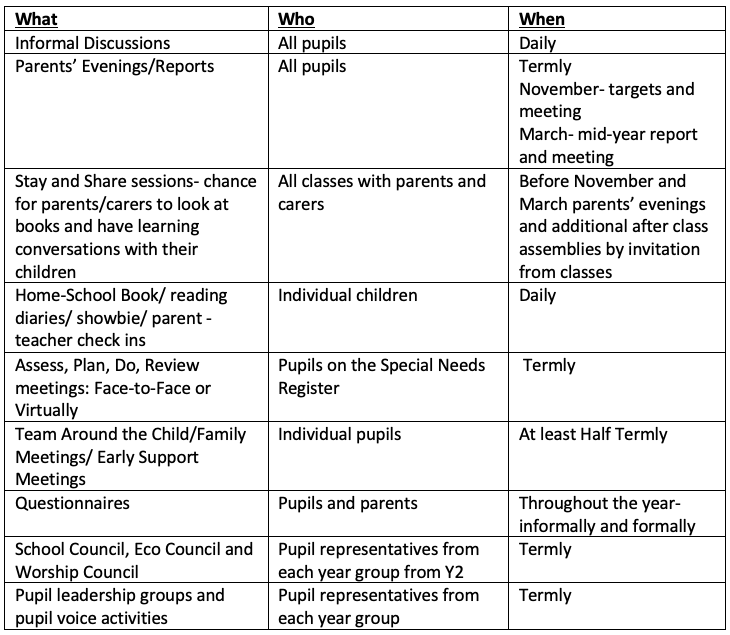
The Assess, Plan, Do, Review Cycle:
For children on our SEND Register, an Assess, Plan, Do, Review cycle was established by the SENCo in partnership with the child their parents and the class teacher. Please see our SEND Policy for further details.
This year, provision made for children on our Special Needs Register has been:
- Communication and Interaction –Episodes of Speech and Language Therapy, from SALT trained TAs under the supervision of a Speech therapist, support for transitions between phases, classes and schools, social stories, Phonics support both 1:1 and in small groups using Unlocking Letters and Sounds Interventions and Nessy software programme, Care Farm provision, choices boards, visual aids including personalised timetable.
- Cognition and Learning – Differentiated tasks through the star Challenge, pre-teaching of key vocabulary, skills and concepts, post teaching to further develop concepts, repeat and reinforce or address misconceptions in a swift manner, 1:1 TA support for some learning, phonics support, Additional reading support e.g. Boosting reading programme, Barrington Stoke books, daily reading, targeted guided reading groups, access to word processing facilities and alternative ways of recording work, additional feedback and conferencing around writing, focussed maths interventions linked to basic skills, recall and number facts, Wave 3 maths, Snip Literacy, Word Wasp, Toe by Toe, Write from the Start, personalised spellings, sound mats, word lists, illustrated dictionaries , memory aids, 1:1 Tuition Ready Check, Go, Task Sheets
- Social, Emotional and Mental Health – ELSA interventions for bereavement, friendships, anxiety, understanding divorce and separation, self-esteem, anger management, support for transitions between phases, classes and schools, social stories, behaviours support and support with managing emotions, cosy cabin to support lunchtime social and emotional needs at the point of need, Individual Behaviour Plan, visual timetables and cues, use of buddy system playtime monitoring individual behaviour plans home school liaison, additional transition arrangements, work stations (for parts of the day) Lego play, Forest school. Gardening, alternative lunchtime provision, yoga and mindfulness, MISP (massage in school programme), Care Farm, Growth mindset, Draw and Talk, Music Tuition. This is done through a referral process which may be requested by parents/ carers or staff and then referred for assessment and time allocated by our trained ELSA specialists. All ELSA sessions are monitored from entry to exit points to ensure the sessions are timely and impactful.
- Sensory and/or Physical Needs – Provision of equipment including, changing facilities, smart moves (gross motor skills), fizzy hands, dough disco (fine motor skills), multi-sensory approach to phonics, construction activities, brain gym exercise, sand and water play, provision for left handed equipment, awareness of fatigue and provision of a safe space to rest, scribe, differentiated PE lessons, ear defenders, intimate care plans, health plan, physio exercises (fine and gross motor skills) , Health Care Plan, Intimate Care Plan.
During the 2022/23 academic year, we had 33 Children receiving SEN Support and 5 children with Education, Health and Care Plans.
We monitored and evaluated the quality of SEND provision by:
-
- Reviewing pupils’ individual progress towards their goals each term (Pupil Progress Meetings.)
- Reviewing the impact of interventions after their implementation (6-10 weeks.)
- Using pupil questionnaires (pupil voice)
- Monitoring by the Senior Leadership Team, including classroom observation, book scrutinies, data analysis and pupil voice feedback.
- Performance Management, annually, by the Senior Leadership Team to include provision & outcomes for vulnerable learners & inclusion.
- Using provision maps to map support across the school
- Holding annual reviews for pupils with EHC plans
- Team Around the Child Meetings for those children with external agency involvement.
- Team Around the (Family TAF) for those with family’s external agency involvement.
- Review by the SEND governor
Support Staff Deployment:
Support staff were deployed in a number of roles:
- Support in Classroom
- 1 : 1 Provision (for those with an EHCP only and only for allocated times according to need, not full time 1:1 support)
- Small group intervention
- Playground support
- Lunchtime support
- Breakfast Club
- First Aid
- Support for medical needs
- Forest school and gardening for therapy
- ELSA (emotional literacy support)
- SLCN- Speech and Language and communication support
- Transition support for starting school, moving to next classes and secondary education
We monitored the quality and impact of this support by observations of lessons and unstructured times, pupil voice, parent views and book looks.
Distribution of Funds for SEND:
SEND funding was allocated in the following ways:
- Support staff
- External Services (See School Offer)
- Teaching and Learning resources
- Staff training
Continuing Development of Staff Skills:
Individuals’ CPD this year:
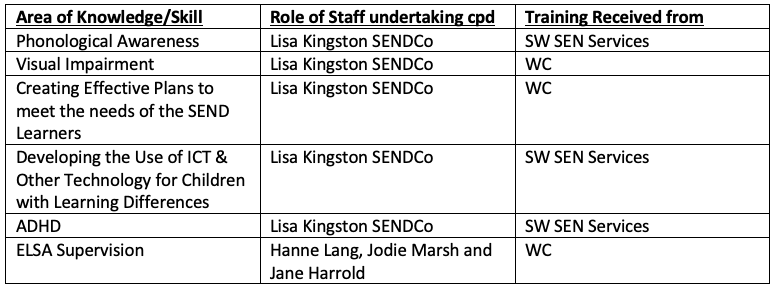
Whole Staff / Group Training (INSET)

We monitored the impact of this training by observations of interventions, book looks, progress made, decline in the number of recorded incidents, staff requests for children to be screened for Dyslexia and Dyscalculia, referral requests for ADHD.
Partnerships with other schools and how we manage transitions:
We have worked with a number of schools in the area regarding transition to secondary schools.
This year 1 child required SEN Support and 0 children with Education, Health and Care Plans who joined us from other schools.
We supported the transition from local nurseries into our Reception class by having pre-arranged visits to the school by the children, new parents evening and when requested individual tours of the school with the opportunity to discuss concerns with the Head Teacher and SENDCo.
We helped children to make the move from the Early Years Foundation Stage to KS1 and from KS1 to KS2 by Moving up Days, informal visits to new classroom, informal meetings with the new class teacher, transition booklets and opportunities to ask questions about their next stage and in some cases keeping Teachers/ Tas with the class for continuity.
The transition from Year 6 to secondary school has been supported through liaising with the Secondary school SENDCos, visits to the secondary schools and where appropriate personalised visits for individuals.
For children with SEND, we also arrange special taster days, extra visits and a Transition Pack which includes for example maps and plans of the school and photos of staff and key parts of the school.
Parents were included in this process through regular meetings.
Ongoing development:
We work hard to ensure that any areas of support for our learners that can be improved are identified and that strategies are put in place to make those improvements. We do this through our School Improvement Plan, which includes our SEND Action Plan.
Evaluating the effectiveness of SEND provision
We evaluate the effectiveness of provision for pupils with SEND by:
- Reviewing pupils’ individual progress towards their goals each term (Pupil Progress Meetings).
- Reviewing the impact of interventions after their implementation (6-10 weeks).
- Using pupil questionnaires (pupil voice).
- Monitoring by the Senior Leadership Team, including classroom observation, book scrutinies.
- Performance Management, several times per year, by the Senior Leadership Team to include provision & outcomes for vulnerable learners & inclusion.
- Using provision maps to map support across the school
- Holding annual reviews for pupils with EHC plans
- Review of Individual Education Plans 3 times per year
- Team Around the Child Meetings for those children with external agency involvement.
- Team Around the (Family TAF) for those with families external agency involvement.
- Review by the SEND governor.
Our complaints procedure:
Complaints about SEND provision in our school should be made to the class teacher, in the first instance. They will then be referred to the school’s complaints policy
The parents of pupils with disabilities have the right to make disability discrimination claims to the first-tier SEND tribunal if they believe that our school has discriminated against their children. They can make a claim about alleged discrimination regarding:
- Exclusions
- Provision of education and associated services
- Making reasonable adjustments, including the provision of auxiliary aids and services
This year we received nil complaints with regard to SEN support and provision.
Other relevant information and documents:
The Designated Safeguarding Lead in our school is Mrs Samantha Saville
The Designated Looked after Children teacher in our school is Mrs Samantha Saville
The Designated Senior Mental Health Lead in our school is Mrs Samantha Saville
The Local Authority’s Offer can be found at https://localoffer.wiltshire.gov.uk/
Our Accessibility Plan can be found on our website http://www.akps.org.uk/wp-content/uploads/AK-Accessibility-Plan.pdf
Our SEND Policy and School Offer (our contribution to the Local Offer) can be accessed via the links on our website http://www.akps.org.uk/wp-content/uploads/2023/07/AK-SEND-Policy-2023.pdf
Details about our curriculum, including how it is made accessible to children with SEND can be viewed from the link on our website
Details of how we keep children safe can be found in our Safeguarding Policy which can be viewed on the school website.AKPS Child Protection policy 2024-2025
Our SEND Policy, School Offer and Annual SEN Information Report have been written in accordance with the Disability Discrimination Act 1995, the Equality Act 2010 and the Children and Families Act 2014.
Contact details of support services for parents of pupils with SEND
AUTISM https://www.autism.org.uk/about.aspx
https://www.wiltshirelocaloffer.org.uk/support-in-wiltshire-autism-parent-programme-swapp/
SEND https://www.wiltshirelocaloffer.org.uk/wp-content/uploads/2014/07/SEND-Strategy-Final-June2016.pdf
DYSLEXIA https://www.bdadyslexia.org.uk/about
ADHD https://www.adhdfoundation.org.uk/information/young-people/
MENTAL HEALTH https://youngminds.org.uk/find-help/your-guide-to-support/guide-to-camhs/
SOCIAL CARE https://www.gov.uk/report-child-abuse / https://www.nspcc.org.uk/what-you-can-do/reportabuse/
Parenting Courses for those with SEND children: https://www.wiltshire.gov.uk/parenting-support/parenting-courses
Contact details for raising concerns:
Class Teacher via: office@ashtonkeynes.wilts.sch.uk
Mrs Kingston SENDCO: l.kingston@ashtonkeynes.wilts.sch.uk
Mrs Saville Head teacher: via office@ashtonkeynes.wilts.sch.uk
The Ashton Keynes CE Primary School Governing Body approved this SEND Information Report.
General Information:
What should I do if I think my child has special educational needs?
How will the school identify and/or let me know if my child has SEN?
Supporting your child:
What support will there be for my child?
What specialist services and expertise are available at or accessed by the school?
How is the decision made about what type and how much support my child will receive?
Specific needs information & support:
Social, Emotional & Mental Health
Communication:
How will school keep me informed about my child’s progress?
Are parents and carers involved in planning, assessment and review of needs?
Are pupils involved in reviewing their learning
General things you might want to know?
How accessible is the school setting?
Who will be responsible for my child’s day to day needs?
Will my child be able to go to after school activities and trips?
Who makes the decision about how much support my child will have?
Who should I talk to if I have a concern about my child in school?
Who makes sure that children with SEN are looked after well?
Who do I contact if I am not happy with the support or education my child is getting?
Moving on:
We are very keen to hear how you think we can improve our service, so feel free to contact the school SENCO and tell us what you think!


